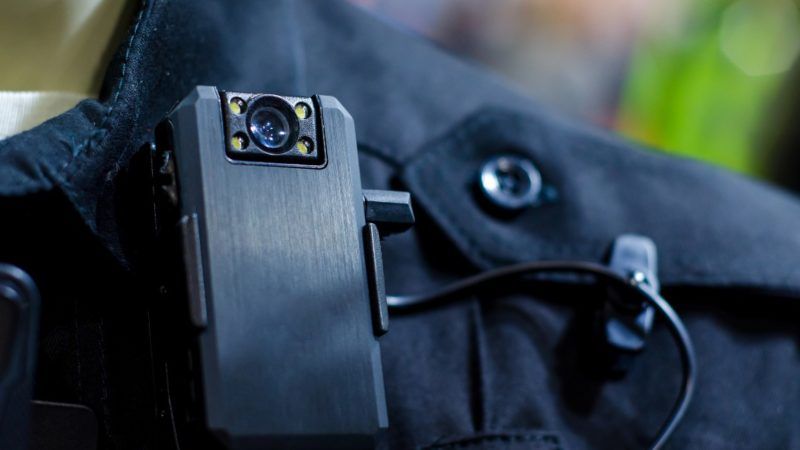Justice Department Will Let Local Cops Wear Body Cameras in Task Force Raids
It's an improvement over the status quo. But time will tell how frequently the feds try to suppress important footage.

The Justice Department today announced an important change in policy: Local police will be able to use their body-worn cameras when they're involved in a task force with federal officers.
Over the past decade we've seen a huge and somewhat successful push to have police wear cameras. The aim is to better document their behavior, to hold them accountable when they engage in misconduct, and to clear them when they're innocent.
Under President Barack Obama, the Department of Justice encouraged local police departments to buy body cameras, offering millions of dollars in grants to help fund the purchases. At the same time, strangely, federal law enforcement agencies did not start wearing body cameras. Furthermore, the Justice Department barred local cops from wearing these cameras during multiagency task forces involving federal officers. If, say, local deputies teamed up with the Drug Enforcement Administration for a raid, no cameras were permitted.
This conflicted approach was highlighted in September, when U.S. Marshals teamed up with three other local law enforcement agencies to arrest antifa activist Michael Reinoehl outside Olympia, Washington. (Reinoehl was wanted for second-degree murder in the death of Aaron Danielson, a member of the right-wing group Patriot Prayer killed during a protest in Portland, Oregon.) The attempt to arrest Reinoehl went bad, and Reinoehl was shot and killed by police on the scene under suspicious circumstances. Eyewitnesses say the police never identified themselves before shooting him. The police say Reinoehl was trying to pull a gun on them, a gun that was reportedly found in his right pocket. Maybe Reinoehl's death was an illegal execution; maybe it was self-defense. We'll never see any body camera footage providing the evidence either way.
Now that policy is changing. The Department of Justice, determining that a previous pilot program had been successful, today announced that it will permit local law enforcement officers to keep wearing their body cameras and to record some police encounters: "The department's policy will permit federally deputized officers to activate a body-worn camera while serving arrest warrants, or during other planned arrest operations, and during the execution of search warrants."
That's a huge improvement, but it doesn't change the fact that federal agents themselves do not wear body cameras during these arrests and raids. (And it's not like the department doesn't have the money to pay for the cameras.) The rules are also full of exceptions, forbidding body cameras when the feds are "using specialized or sensitive investigative techniques, operating in a sensitive area, or working in an undercover or covert status on behalf of the federal task force or federal agency as determined by the federal agency sponsoring the task force." The federal agency organizing the task force can veto camera recording for "highly specialized or sensitive operations."
Furthermore, all the recordings will be deemed federal records, even though they're recorded by local cops. Federal guidelines, not local public records laws, will determine the release of any footage collected. It can take years for the Department of Justice to comply with public records requests, and the guidelines establish a presumption that the recordings are sensitive information: "Nothing in this policy shall be deemed to provide a right of public access to…recordings." When a body camera ends up recording footage of a serious injury or death of another person during one of these task forces, the federal government will decide the timeline for the footage to be released.
It's an improvement over the status quo. But we'll have to see how frequently the feds try to stop the release of important footage.


Show Comments (21)